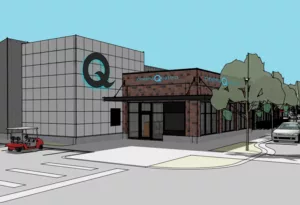
Home » Avista Edge enters broadband market
Avista Edge enters broadband market
Subsidiary starts pilot, wants to grow into Idaho and nationally eventually

January 27, 2022
A subsidiary of Spokane-based Avista Corp. is piloting a high-speed broadband project in partnership with the City of Cheney and plans to expand to 6,500 customers throughout at least two communities in the Inland Northwest.
Mark Gustafson is director of innovation and strategy at Avista Corp. and is president and CEO of Avista Edge Inc. Avista Edge was created in mid-2020 as a nonutility subsidiary focused on deploying Avista’s broadband technology.
“We’ve created technology and service that enables an electric utility to be a retail broadband internet service provider,” Gustafson says.
Avista Edge will provide high-speed broadband internet via a patented device that attaches to an electric meter. The device operates via 5G networks, to which it connects via wireless signals installed at strategically selected sites.
Gustafson says that capability is especially important to underserved and rural communities, which might not always have reliable internet access through traditional broadband delivery methods.
The company is piloting the new technology through a partnership program with the city of Cheney, a community of 12,640 people about 20 miles southwest of Spokane.
“Avista Edge technology is allowing the City of Cheney to be a retail provider to its citizens with our technology,” Gustafson says.
Gustafson says Avista Edge already has another broadband customer lined up—Bonners Ferry, Idaho, a rural community of about 2,600 people in northern Boundary County, about 100 miles northeast of Spokane. Service there will follow on the heels of the Cheney neighborhood pilot launch, Gustafson says.
Avista Edge aims to serve about 6,500 customers by year-end, and the company plans to take its technology to the national scale within 10 years, he says.
Avista Edge currently has six full-time employees. Gustafson says additional workers will be added as the company grows.
For Avista Edge, Gustafson says the move into broadband represents parent company Avista’s interest in providing essential services that align well with the company’s existing services.
“We explore investments, both internal innovation and external, that help shape the future of the utility,” Gustafson says. “It helps us redefine what the utility might look like in the future.”
Gustafson says that Avista has been aware of the increasing nature of broadband internet as an essential service, and the need for reliable internet increased with the effects of the COVID-19 pandemic.
“We really believe that the internet is the new electricity,” Gustafson says. “We wanted to explore utilities being able to offer retail high-speed broadband services even before the pandemic—the pandemic just accelerated that need.”
Gustafson says providing broadband internet is likely to become a common service through utility companies.
“Utilities are local, they’re trusted partners in their communities,” he says. “Other utilities are exploring being a retail internet service provider. Some co-ops in the Midwest are serving fiber to the home services.”
However, Gustafson says Avista Edge is different because it uses 5G networks.
“One of the advantages of the fixed-wireless system that we’ve created at the electric meter is that we can deploy this fast—faster than fiber to the home, which takes years to deploy and is very expensive,” Gustafson says. “Ours is less expensive and much faster. We can deploy on the order of months.”
Laurine Jue, senior communications manager at Avista Corp., notes that Avista is familiar with the complexities involved in providing services over networks.
“We have experience in systems, in networks, in how we deliver services to customers, and this is an extension of that,” Jue says.
The broadband device Avista invented has several patents in the U.S., he says, and international patents are pending.
“It makes sense that the utility’s involved in delivering internet as a new essential service, because in five minutes, we can easily install that device, and have that customer up and running,” Gustafson says.
The device is assembled in the U.S., and Avista Edge is looking at some local contract manufacturing companies to produce parts as the project grows out of the pilot phase, he says.
“It came out of Avista a couple of years ago with some of the innovation work that we do inside Avista,” Gustafson says. “We continually look for opportunities to be innovative with our unregulated spinouts.”
Gustafson notes that Avista Edge has been supported financially by shareholders and isn’t funded by Avista Utility’s customers.
Mark Schuller, Cheney city administrator, says Cheney had few options for internet providers prior to Avista Edge’s pilot program.
“If you turn back the clock three years, Cheney had two internet providers, Davis Communications and CenturyLink,” Schuller says. “They simply weren’t meeting the high-speed and reliability needs of the community at that point. We were actively searching for options to bring to town.”
Schuller says Avista Edge approached city leaders about launching the broadband pilot in Cheney, and the city moved quickly to sign a three-year contract with the company. The city pays nothing to participate in the pilot, Schuller says, though the city will cover the minimal costs of housing some equipment associated with the project.
The pilot in Cheney will begin with the Harvest Bluff and Avalon neighborhoods of northeast Cheney. Customers in those neighborhoods will receive invitations to participate in the Avista Edge pilot program in the next couple of weeks.
Initially, Avista Edge will offer broadband for a flat, prepaid fee of $99 per month. Installation fees will be waived for pilot customers. The service will focus on single-family homes and small businesses before shifting to multifamily residences and larger businesses in late 2022 or early 2023.
“We hope to have Cheney fully covered by the end of the year,” Gustafson says.
Susan Davis, owner of Cheney-based internet service provider Davis Communications Inc., says Avista Edge’s presence will create competition for internet service providers that already are established in the area.
“With more competition coming to this area, we’ll more than likely show a decline in clientele, but competition can be healthy for us and our community,” Davis says via email.
Davis says Davis Communications has operated in the Cheney area for more than 40 years. The company currently offers upload speeds of up to 35 megabits per second and download speeds as fast as 1 gigabyte per second over a direct wired connection. Internet service fees range from $69.95 for up to 25 megabytes per second to $129.95 for up to 250 megabytes per second.
Avista Edge will offer upload and download speeds of 100 megabits per second.
Latest News
Related Articles




